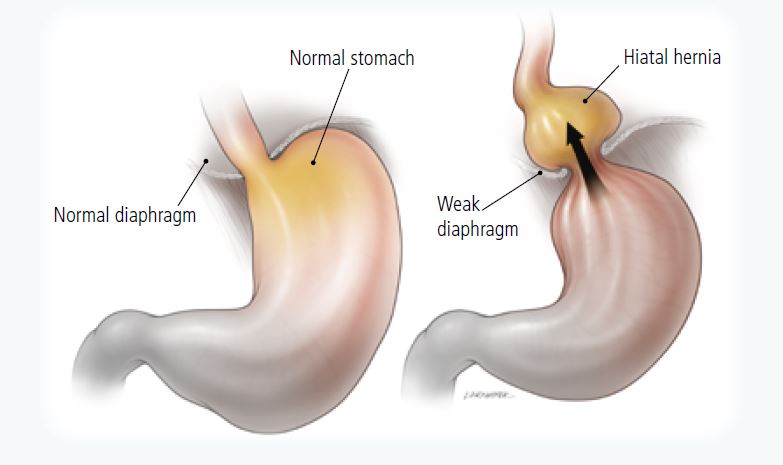
A hiatal hernia occurs when the upper part of the stomach bulges through the large muscle separating the abdomen and chest (diaphragm). The diaphragm has a small opening (hiatus) through which the food tube (esophagus) passes before connecting to the stomach.
In a hiatal hernia, the stomach pushes up through that opening and into the chest. A small hiatal hernia usually doesn’t cause problems. A person may never know they have one unless the doctor discovers it when checking for another condition.
A large hiatal hernia can allow food and acid to back up into the esophagus, leading to heartburn. Self-care measures or medications can usually relieve these symptoms. A very large hiatal hernia might require surgery.
There are two main types of hiatal hernia: sliding and paraesophageal.
Sliding Hiatal Hernia – the stomach and the lower part of the esophagus slide up into the chest through the diaphragm. Most people with hiatal hernia have this type.
Paraesophageal Hernia – more dangerous type, the esophagus and stomach stay where they should be, but part of the stomach squeezes through the hiatus to sit next to the esophagus. The stomach can become squeezed and lose its blood supply. Doctors might call this a strangulated hernia.
Hiatal Hernia Symptoms:
- Heartburn from gastroesophageal reflux disease (GERD)
- Chest pain
- Bloating
- Burping
- Trouble swallowing
- Bad taste in the mouth
- Upset stomach and vomiting
- Backflow of food or liquid from the stomach into the mouth
- Shortness of breath
Get medical care right away if you have hiatal hernia and have the following symptoms:
- Severe pain in the chest or belly
- Upset stomach
- Vomiting
- Can’t poop or pass gas
These could be signs of a strangulated hernia or an obstruction, which are medical emergencies.
Causes
There is no clear indication of why most hiatal hernias happen. Causes might include:
- Being born with a larger hiatal opening than usual
- Injury to the area
- Changes in the diaphragm as a person ages
- A rise in pressure in the belly, as from pregnancy, obesity, coughing, lifting something heavy, or straining on the toilet.
Diagnosing Hiatal Hernias
Several tests can diagnose hernia.
- Barium X-ray – the x-ray provides a clear silhouette of the upper digestive tract. The image allows the doctor to see the location of the stomach.
- Endoscopy – the doctor will be able to see if the stomach is pushing through the diaphragm. Any strangulation or obstruction will also be visible.
Treatment
Most cases of hiatal hernia don’t require treatment. The presence of symptoms usually determines treatment. If a person has acid reflux and heartburn, they may be treated with medications or, if those don’t work, surgery.
Medications – the doctor may prescribe medications such as
- Over-the-counter antacids to neutralize stomach acid
- Over-the-counter prescription H@-receptor blockers that lower acid production
- Over-the-counter or prescription proton pump inhibitors to prevent acid productions, giving the esophagus time to heal
Surgery – if medicines don’t work, a person might need surgery on the hiatal hernia.
Some types of surgery for this condition include:
- Rebuilding weak esophageal muscles
- Putting the stomach back in place and making the hiatus smaller
To perform surgery, doctors either make a standard incision in the chest or abdomen, or use laparoscopic surgery, which shortens recovery time.
What We Offer
We at Almurshidi Medical Tourism will find the best doctors to cater to your needs. We are partnered with a wide network of hospitals and clinics that provide top quality medical experience.
We provide free medical estimates, make medical appointments, and provide several medical opinions if needed at no cost.
Contact Us
For more information contact us at +66822004040 or via WhatsApp





